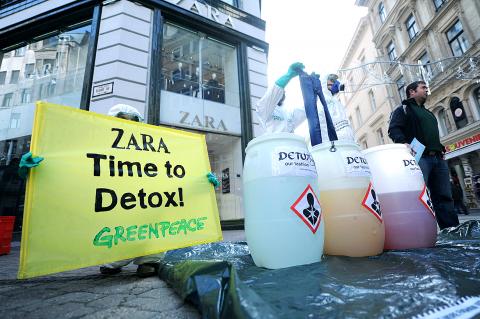An investigation on clothing from 20 global fashion brands showed that 63 percent of the garments contained hazardous nonylphenol ethoxylates (NPE) and a number contained plasticizers or other cancer-causing compounds, Greenpeace said yesterday.
The non-governmental organization made the announcement during the release of its new global investigative report on hazardous chemicals used in the textiles of garments sold at 20 popular global brands, including Armani, Benetton, Calvin Klein, Diesel, Esprit, Gap, H&M, Levi’s, Mango, Tommy Hilfiger and Zara.
Rose Lai (賴倩如), Greenpeace’s pollution prevention campaign director in Taiwan, said a total of 141 garments were purchased from 29 countries and regions around the world in April, including two items bought from stores in Taiwan — a pair of children’s pants by Zara and a men’s T-shirt by Levi’s.

Photo: AFP
The investigation revealed that detectable levels of NPEs were found in 89 of the garments.
“NPEs are often used as detergents or surfactants in the manufacturing process of textiles and can be washed away with water, but NPEs break down into nonylphenols [NP] in the water” Lai said. “NPs are known to be persistent and bio-accumulative toxic substances, which act as hormone disruptors in the body and also accumulate in the tissues of fish and other organisms.”
In addition, the tests discovered detectable levels of plasticizers in 31 garments, including high levels of toxic phthalates in four of the garments, and cancer-causing amines from the use of certain azo dyes in two.
Among the two items bought in Taiwan, a detectable level of NPE was found on the pants by Zara and three types of plasticizer — diethyl phthalate, di-n-butyl phthalate and di(2-ethylhexyl) phthalate — were found on the Levi’s T-shirt.
Although the levels of substances found in the clothes were not considered illegal in Taiwan, Lai said the major brands should bear social responsibility and eliminate the use of these chemicals.
In addition, the companies should “make public information about the use of the chemicals and wastewater discharges containing these substances, and also plan to phase out their use to achieve a goal of zero toxic discharges,” she said.
Lai said Greenpeace’s Detox campaign last year persuaded seven international sportswear brands to commit to finding solutions to cease using the toxic chemical substances in the manufacturing process by 2020, so the organization is also urging fashion brands to take responsibility for the public and the environment.
At present, regulations on the use of these toxic substances are very limited in Taiwan.
The Environmental Protection Administration only prohibits the use of NPE in the manufacture of household detergents and the Toxic Chemical Substances Control Act (毒性化學物質管理法) prohibits four kinds of plasticizers in the manufacture of items for children under 14 years old.
“The government should take a precautionary attitude and pay more attention to toxic pollution and enact stricter regulations for the full-scale management and control of these toxic substances,” Lai said.

DAREDEVIL: Honnold said it had always been a dream of his to climb Taipei 101, while a Netflix producer said the skyscraper was ‘a real icon of this country’ US climber Alex Honnold yesterday took on Taiwan’s tallest building, becoming the first person to scale Taipei 101 without a rope, harness or safety net. Hundreds of spectators gathered at the base of the 101-story skyscraper to watch Honnold, 40, embark on his daredevil feat, which was also broadcast live on Netflix. Dressed in a red T-shirt and yellow custom-made climbing shoes, Honnold swiftly moved up the southeast face of the glass and steel building. At one point, he stepped onto a platform midway up to wave down at fans and onlookers who were taking photos. People watching from inside

A Vietnamese migrant worker yesterday won NT$12 million (US$379,627) on a Lunar New Year scratch card in Kaohsiung as part of Taiwan Lottery Co’s (台灣彩券) “NT$12 Million Grand Fortune” (1200萬大吉利) game. The man was the first top-prize winner of the new game launched on Jan. 6 to mark the Lunar New Year. Three Vietnamese migrant workers visited a Taiwan Lottery shop on Xinyue Street in Kaohsiung’s Gangshan District (崗山), a store representative said. The player bought multiple tickets and, after winning nothing, held the final lottery ticket in one hand and rubbed the store’s statue of the Maitreya Buddha’s belly with the other,

Japan’s strategic alliance with the US would collapse if Tokyo were to turn away from a conflict in Taiwan, Japanese Prime Minister Sanae Takaichi said yesterday, but distanced herself from previous comments that suggested a possible military response in such an event. Takaichi expressed her latest views on a nationally broadcast TV program late on Monday, where an opposition party leader criticized her for igniting tensions with China with the earlier remarks. Ties between Japan and China have sunk to the worst level in years after Takaichi said in November that a hypothetical Chinese attack on Taiwan could bring about a Japanese

‘COMMITTED TO DETERRENCE’: Washington would stand by its allies, but it can only help as much as countries help themselves, Raymond Greene said The US is committed to deterrence in the first island chain, but it should not bear the burden alone, as “freedom is not free,” American Institute in Taiwan Director Raymond Greene said in a speech at the Institute for National Defense and Security Research’s “Strengthening Resilience: Defense as the Engine of Development” seminar in Taipei yesterday. In the speech, titled “Investing Together and a Secure and Prosperous Future,” Greene highlighted the contributions of US President Donald Trump’s administration to Taiwan’s defense efforts, including the establishment of supply chains for drones and autonomous systems, offers of security assistance and the expansion of